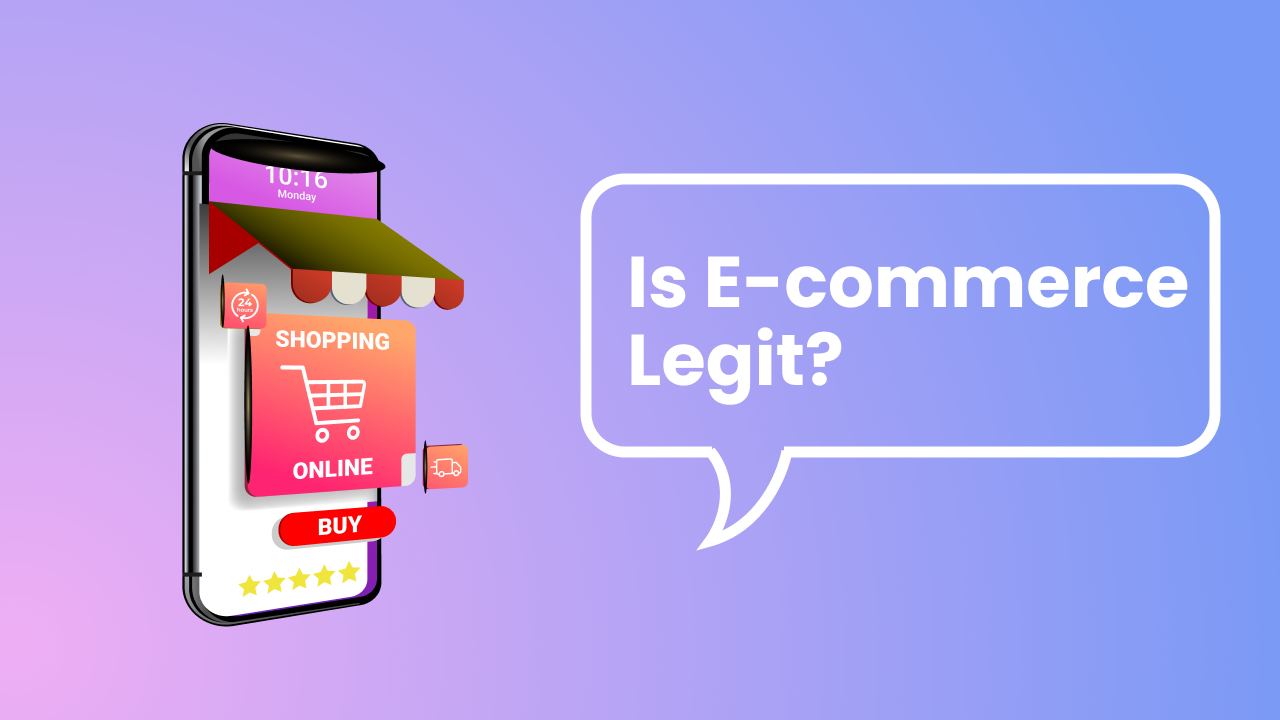
E-commerce, the virtual marketplace, is the process of buying and selling goods or services over the Internet. It’s legit because it’s a legitimate way to do business in this digital era. You can buy and sell anything online, from clothes to books to food. It is the digitization of commercial activities.
As the popularity of e-commerce is constantly growing, people are also being aware of the e-commerce scams which are equally increasing. So you must be wondering ‘is eCommerce legit?’
In this content, we will let you know the ins and outs of eCommerce, from its benefits to its threats and everything in between. This guide also includes all the basic frequently asked questions along with the question ‘is eCommerce legit?’. After reading this content, all your doubts related to eCommerce will be cleared. So let’s begin without any delay!
What is E-commerce?
It’s the 21st century and you do not need to visit any local shop to buy products. You simply go to a website, give some clicks and you are good to get the product at your doorstep. It’s that simple! And the game change behind this is e-commerce!
E-commerce, short for electronic commerce, refers to the buying and selling of goods or services using the internet. This digital marketplace eliminates the traditional physical presence required in commercial transactions, allowing businesses and consumers to engage in trade online. Like any traditional business, you can sell any physical product in eCommerce. According to the definition of Forbes, e-commerce is the process through which people buy products on digital platforms.
It enables consumers to browse and purchase items at any time, from any location, via a computer, smartphone, or other internet-enabled devices. Similarly, businesses can reach a global audience, transcending geographical limitations and time zones.
In some cases, you need to follow some rules to run an e-commerce page. But otherwise, it is very easy to buy products and services and sell them on the internet. You can choose any niche of products to target your audience.
Related: How to start a flower shop online
Comparison with Physical Store
| Ways of comparison | Physical Store | E-commerce |
|---|---|---|
| Location | Fixed at a place | Can be accessed from any place in the world. |
| Product Type | All products are physical that can be seen and touched. For example – books, food, clothes, etc. | Products can be both physical and digital such as an e-book, an online course, music, videos, etc. |
| Variety and inventory | Limited space to showcase products | A great variety of products as the space is not limited |
| Accessibility | Has a certain time period for accessibility | Can be accessed 24/7 |
| Overhead Costs | Sensory feelings are missing in e-commerce. | Lower overhead costs |
| Tangibility | More tangible as it allows customers to touch. | Sensory feelings are missing in ecommerce. |
| Delivery system | You have to visit the store to get the product. | You will get delivery at your door which is more convenient. |
How can I Check the ecommerce trustworthiness?
Determining the e-commerce trustworthiness is crucial to ensure a secure and reliable shopping experience. As you will spend your hard-earned money for shopping, you must check first whether the website is genuine or not.
You will find a lot of online fake eCommerce websites that initially create a legitimate brand image and later deceive you with many fraudulent activities.
So it is up to you how you choose the best and genuine service provider. Here are some ways to check whether an eCommerce website is genuine or not –
1. Contact Details
Any genuine website will have proper contact details including their email, phone numbers as well as the physical address. If these are not found on any website or there is only a generic email mentioned then you can doubt its authenticity.
This is because if you are providing a service you would like to share your contact details so that the prospect can reach out to you with any doubts or questions. This will ensure legitimacy of e commerce and will positively target your customers. Now think who will have the website without any contact details?
2. Customer Reviews and Ratings
This is the best way to know about the authenticity or quality of anything in the online world. You will find lots of reviews and feedback about a service or product on the web.
Read these reviews and try to get as much knowledge as possible about that eCommerce website. In addition, if the website is genuine they will add these reviews to their website as well. So try to find them.
3. Team Introduction
Team introduction is a key point to understand whether the site is authentic or not. Most businesses add their team members’ introductions to their website where you can see their pictures, know their status in the business and get some additional information about them. It can also be a great way to find out the legitimacy of ecommerce.
4. The Visual Look of the Website
This can be an important strategy to ascertain the legitimacy of eCommerce. Usually, scammers do not invest much money in building a website.
They will try to include cheap quality graphics, colors and other website designs as investing in all of these will incur unnecessary costs as no scam lasts long.
Similarly, a highly authoritative person will not compromise on the quality and design of the website as they know that their business is for a long-term purpose.
Also, always look at the address bar before browsing any website. If you see a small padlock in the address bar of a website that means the website uses appropriate security to keep all customer details encrypted.
5. Social Media Presence

A legitimate e-commerce company will try to make their presence known as they know how powerful social media is and how many customers it can get from such platforms. And the same thing goes for fake websites.
They know that they cannot commit fraud if they have a huge presence because of the popularity of social media platforms. The more social presence an eCommerce company has, the more it proves its legitimacy.
Business Idea: How to Start a Shoe Business Online
6. Privacy and Return Policies
Genuine sites provide clear privacy policies and return or refund guidelines. They have a list of policies regarding this. So, lack of these policies or vague terms should raise concerns among customers.
7. SSL and Certificates
SSL means Secure Sockets Layer. For e-commerce, having an SSL certificate is crucial for building trust with customers. SSL and certificates are like digital ID cards for websites. It will help you to establish legitimacy and security for your online store. When customers see the padlock or “https://” in the address bar, they feel more confident to enter their payment details and personal information.
8. Payment Security
A legitimate ecommerce will always have a secured payment system. Secured payment systems like PayPal, credit/debit cards, or trusted payment gateways are to be included to gain customers’s trust and credibility. When a site asks for unusual payment methods, you should avoid them.
9. Responsive Customer Service
Legitimate e-commerce sites offer accessible customer service. Reach out to their support and check their responsiveness to ensure they’re available to assist you. Their virtual assistance will help you understand anything you need to know about their ecommerce.
Ecommerce laws and regulations in 2024
Like a regular business, online stores should also have certain laws and regulations that people need to follow and comply with. These laws are designed to create a safe and secure online experience for both business owners and customers.
Like the laws and regulations of any other brick and mortar business, e-commerce must comply with taxes, licenses, and permits, business insurance, etc. Besides,
Online businesses have to comply with certain digitally provisioned laws as well that are specifically designed for digital transactions and digital customers.
How to ensure the reliability of E-commerce Platforms?
As an e-commerce owner, you must be aware of the online laws, learn them before starting your online store and enforce them properly to keep yourself as well as your online business safe from regulatory actions. This is the key step to earn the reliability of e-commerce platforms. Some of these laws are –
1. Data Privacy
A website may wish to collect various data regarding the customer to maximize sales and build a better customer database.
But data privacy laws restrict business owners to collect or store customers’ personally identifiable information such as an address, debit card, or credit card details, etc.
Also, you need to disclose the information that your website is collecting certain data from web browsers.
2. Copyright Protection
Each e-commerce has its own images, music, writing, videos, etc. which they use on their websites to promote their products or services.
Copyright laws safeguard your right to these intellectual properties and prohibit others from using them without your consent. So you need to take applicable measures to protect your intellectual property from theft.
3. International Sales Laws and Regulations
International companies operate differently. If you want to sell internationally then you have to comply with the international shipping rules, taxes, consumer rights, duties, and various other taxes and laws of that particular country.
Although you don’t need in-depth research on these topics, you should learn the basics of these laws from experts.
4. Age Restriction
Your website should comply with the laws of the Children’s Online Privacy Protection Act (COPPA). Your website must comply with the laws of the Children’s Online Privacy Protection Act (COPPA). According to their law,
You cannot collect personal data of a child under the age of 13. In addition, if you sell certain age-restricted products, implement age restriction policies on your website.
5. Shipping Restrictions for ecommerce platform
Not all shipping companies ship the same products. Some may have their own rules and regulations, therefore, restricting the shipping of some products.
Again some companies may charge extra for shipping restricted products. So be aware of these laws, especially if you intend to ship internationally.
Related: How to Start an Online Business as a Teenager
What is an eCommerce scam?

E-commerce scams refer to fraudulent schemes or deceptive practices carried out in online shopping platforms. These scams aim to deceive consumers, often resulting in financial loss or stolen personal information. Scammers create fake websites or listings that appear legitimate, enticing unsuspecting buyers with attractive deals on products or services.
With the increasing technology and various online systems, these scams are also increasing day by day. So as a merchant you must try and learn about the various eCommerce scams that can harm you and your business.
Common eCommerce scams
Scammers are always ahead of the common people. They may use various tactics such as offering unrealistic discounts, manipulating website designs, or employing urgency tactics to pressure buyers into making quick decisions.
So it is possible that with every new day they come up with a new type of fraud.
However, there are some common eCommerce scams that have been used multiple times by scammers. These are mentioned below –
1. Account takeover fraud
Account takeover fraud means an individual gaining access to a Customer’s User Account. In these frauds, a scammer can obtain the customer’s password and security code.
And by logging into their account they can perform various fraudulent acts like changing account login information, placing bulk orders, stealing addresses and other personal information, etc.
These frauds take place due to the customer’s negligence in account maintenance activities. This type of fraud causes huge losses to the eCommerce brand. In these cases, their goodwill can be greatly affected and thus affect their reputation.
2. Friendly Fraud
Friendly fraud is something where a buyer claims a chargeback from his bank for a transaction done on any eCommerce platform. Scammers can also ask the merchant for a refund for incorrect delivery or even say that he has not received an item. In these cases,
The buyer deliberately tries to convince merchants as well as credit or debit card issuers of situations that have not occurred just to obtain the product or services for free. This type of fraud leads to physical product loss and monetary loss to the trader.
3. Credit card fraud
This is the most common fraud among all and it is increasing day by day. Credit card fraud means fraud committed at an online store using someone else’s bank cards.
Usually, fraudsters steal credit card details along with other personal information and use it to make bulk purchases at an eCommerce company. This type of fraud happens due to the carelessness of the customer and low-security websites
4. Refund Fraud
This is another popular fraud act that seems very normal. Here the fraudster makes purchases from an eCommerce company with stolen credit or debit card details without the consent of the original cardholder.
He then returns those products giving some simple excuse and claims the refund the money in another bank account which is different from the initial payment mode.
In this way, the fake person cheats the trader as well as the customers. Customers often claim chargebacks and demand a full refund for these fraudulent transactions where the merchant may face huge monetary losses.
5. Card testing Scam
Card test scam is very similar to credit card fraud. In these cases, the thief gets access to multiple credit cards through fraud. But here they don’t know whether all the cards are working or not so they test the purchase of products or services which are relatively very small through these cards.
In this way, they also come to know that their transactions went unnoticed. The initial small purchases go unnoticed because people usually don’t check bank statements regularly.
Once the cheaters are successful in these transactions they make a huge costly purchase and place bulk orders causing great loss to the merchant.
6. Non-Delivery Scams
In this scheme, customers pay for products or services that never get delivered. Fraudulent sellers set up enticing listings, receive payment, but never send the purchased items. Victims are left without the product they paid for, losing both money and trust in online transactions. These scams often arise from unverified or dubious sellers operating on unreliable or newly created websites.
Protecting yourself from eCommerce scams
As you have already learned how various frauds can happen in eCommerce, you should protect your business and your customers from such scams by taking necessary action.
But if you take proper measures then you can prevent such frauds and protect your brand reputation and maintain your business revenue. Let us know what are some preventive measures.
10 things you need to look for to avoid eCommerce scams
- First and foremost use authentic, high-quality, and updated software to operate your eCommerce store.
- Comply with Payment Card Industry Data Security Standard requirements. These guidelines help in securing credit card information.
- Use automation processes where you can regularly update all information such as sending emails to customers about their purchases, refund details, etc.
- Use proper systems to collect analytic data and use them to prevent online scams.
- Use a trustworthy, advanced and improved payment gateway method
- Educate customers about how they can keep their account details safe, for instance creating strong passwords, checking emails regularly, etc.
- Always monitor the buying behaviors of the customers. A customer who always spends a small amount if suddenly places a huge expensive order then this can be an alarming sign
- Use third-party solutions for fraud detection and management so that you can identify fraud before it takes place.
- Always use secure Sockets Layer (SSL) security technology to create an encrypted link that can be accessed only between a merchant and the web browser.
- Disclosing all the terms and conditions clearly such as payment policy, refund policy, etc.
Case Studies of Successful E-commerce
There are numerous cases of successful e-commerce worldwide. For example –
- Alibaba : This Chinese e-commerce giant connects businesses and consumers globally. It’s known for its B2B, B2C, and C2C platforms, offering various products. Alibaba’s success lies in its ecosystem that facilitates trade between international buyers and sellers.
- Shopify: A platform that empowers entrepreneurs to set up and manage their online stores. Its success is attributed to its user-friendly interface, a wide range of customizable templates, and tools that simplify the e-commerce process for small businesses.
- ASOS: A popular online fashion and cosmetic retailer catering to a global audience. ASOS’s success is founded on its wide selection, competitive prices, and responsive customer service, offering the latest fashion trends and styles.
- Etsy: A platform catering to artisans, crafters, and small businesses, Etsy thrives on unique, handmade, and vintage items. Its success lies in providing a niche marketplace for individual sellers with a focus on creativity and craftsmanship.
- Uber: Although not a traditional e-commerce platform, Uber’s success as a transportation service relies on an app-based model connecting riders with drivers. It is an ecommerce site that provides transport services on rent. With Uber, you will be able to find convenient and efficient ridesharing services.
How Well Known Marketplaces earned their Legitimacy

Well-known online marketplaces like Amazon and eBay play a significant role in shaping and upholding the legitimacy of e-commerce due to their established credibility, robust infrastructure, and user-focused approach. The ways they earned their legitimacy are-
- They earned the trust and credibility of millions with their longstanding presence and reliable services.
- Verified seller badges and transparent user reviews have played a role to earn legitimacy
- Amazon and eBay comply with regional and international regulations, enhancing their legitimacy.
- With robust customer service and resolution mechanisms, well known marketplaces have earned trustworthiness.
- These marketplaces continually innovate and adapt to meet changing consumer needs. By integrating advanced technology, personalized recommendations, and streamlining user experience, they remain at the forefront of e-commerce evolution.
How to Check for Legitimacy in a Website Building Site
If you are looking to take a service from an e-commerce store, you must check for a few things to understand their e-commerce trustworthiness. If it is an website building agency, you must look for these things –
- Check for any relevant certifications or qualifications that the team possesses. For instance, certifications in website development (such as from Google or HubSpot) or SEO (like Google Analytics or AdWords certifications).
- Check for compliance with web development standards set by organizations like the World Wide Web Consortium (W3C).
- Check whether they have mentioned adherence to Google’s Webmaster Guidelines, focusing on white-hat SEO techniques that prioritize quality content, relevant keywords, and user experience over shortcuts.
- Search thoroughly whether they have displayed any successful case studies and client testimonials related to website building and SEO projects.
- Lastly, check if it is possible to communicate with them clearly about the strategies, methodologies, and expected outcomes.
Is e-commerce a legit way to make money in 2024?
E-commerce is easier, simpler, and more convenient than a physical store. People are now preferring to shop online and online shopping has a high demand in the market. In fact, anyone looking to buy from physical stores compares prices on the internet before each purchase.
So basically shopping behavior has almost become online and that is why eCommerce is a legitimate way to earn money in 2024. Even though it is competitive, you can still earn a huge revenue if you know some of the best ways to make profitable money with eCommerce. Some of them are mentioned below –
Related: How to Start an Online Bookstore
7 best ways to make money online with eCommerce in 2024

1. Build a blog Page
Nowadays anyone who needs any information or has any doubts turns online to get help and tips and this is when you can target your customers.
A blog is where you will upload informative and engaging posts about various things in your industry. A well-written SEO-based blog can attract huge traffic to your eCommerce platform. This way you can target your niche customers and earn money online.
2. Use Advertisements
People often think of it as an expense but advertising is actually an investment. How will your customers know about your products when the market is full of similar product choices?
It is shopping ads that will let your prospects know about the existence of the products. You can increase your sales by marketing your own products through different platforms such as Facebook ads, Instagram promotions, etc.
3. Use social media
The role of social media has changed recently. It is no longer just an entertaining and socially connecting platform. People now make buying decisions based on the influence and trends on these platforms.
Soon these will become direct shoppers’ points. Small business owners are earning huge revenue from social media marketing. So take advantage of social media to grow your business and earn money.
4. Email marketing
People often open their mail to stay updated about their work and other things. Build an email list through which you can target your audience based on their web browsing behavior.
A personal and creative email can make a huge impact on customers and help them complete their buying decisions.
Related: How to Start a Baby Clothing Business Online
5. Invest in Search Engine Marketing (SEM)
SEM is a paid advertisement in Google. Google is everyone’s best friend. People not only search for tips and information on Google but also search for trending products, prices, features, etc.
If you invest in search engine marketing then your products will be shown on Google to them whenever your target customer searches for anything related to your niche.
This is a great way to boost your sales and money online with your eCommerce store.
6. Affiliate Marketing
You can partner with established eCommerce platforms or companies, promoting their products on your website or social media. Earn commissions for each sale made through your referral links.
Upon joining the program, you as an affiliate can receive a unique tracking link or code. This link is used to track their promotional efforts and any resulting sales.
7. Print-on-Demand Services
Print-on-demand (POD) services allow you to create and sell customized merchandise without the need for inventory.
With POD, you design or create unique products such as t-shirts, mugs, phone cases, or any other customizable items. You can design these products yourself or hire a designer to create unique and appealing designs.You market your products through your website, social media, or even established marketplaces.
Is E-commerce Challenging?
After reading all these interesting things here, you must be thinking of starting your own eCommerce business. But the thought of actually starting e-commerce may seem daunting but it doesn’t have to be.
With proper knowledge and guidance, you can build a successful e-commerce website in the simplest ways. All you need is the right guidance and support and the zeal to achieve your dream.
Can you lose money in the eCommerce business?
The online market is very competitive. It follows the trend and is governed by the demand of the modern world. Your products must be properly marketed and advertised to attract a large audience to your business.
The advertising and marketing expenses are generally very high and you may suffer losses if you do not know how to manage all of them strategically. Moreover, there are certain e-commerce scams that can raise the question ‘is eCommerce legit?’, which may further increase your fear.
But it is not something that you cannot learn. If you take help and guidance from experts who have experience in this field, you can learn from them and prevent losses without a hitch.
Does e-commerce Actually Work?
Absolutely! E-commerce can be a game changer in your financial dream! It Works great now and it will do better in the future. The online world is expanding every day. With the increasing technology and advancement, people are moving more and more towards the digital world.
Due to the ease and convenience of working, people now prefer to do online transactions. These signs show that e-commerce will still work and has great potential to grow in the near future.
Should I Start My Own eCommerce Business?
Due to the increasing rate of inflation, starting your own business can be one of your best financial decisions. Even if you start it as a side hustle you can earn a great passive income. E-commerce is easy, popular, and cost effective as compared to traditional shops.
You can easily build your own eCommerce website with the help of experts and build your career even if you are just starting out. With some basic knowledge and the support of an expert team, you can make your dream come true.
When you have your own ecommerce website, you will be able to build the trust and credibility of your customers. Your customers will be persuaded to buy products or services from you.
The Bottom Line
E-commerce, with its inherent trust and transformative potential, continues to reshape the global economy. Its legitimacy is not just a statement but an ongoing commitment to transparency. As we attempted to cover all the basic topics related to e-commerce, hope now you are cleared with your question ‘Is eCommerce legit’ with a detailed clarification.
Now if you are thinking of starting an e-commerce, why sit back? Start your e-commerce today!
If you are struggling to have an ecommerce website, your dream is one step away. Book a 10 minute ‘friendly’ call with us and we promise we will guide you by giving some tips on how you can escalate your online business to the top.
If you still have any questions, please leave them in the comment box below, we will be delighted to assist you. Thanks for reading this post and good luck with your future.
